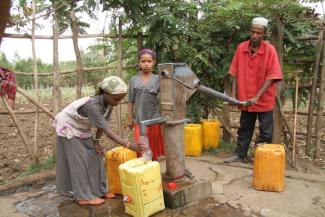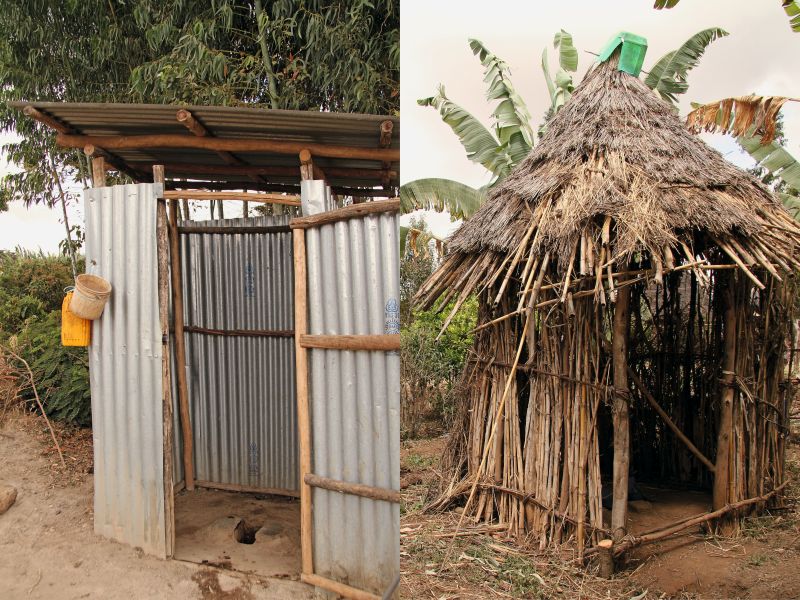Disease control
No water, no hygiene

CBM Germany, a Christian development agency, supports the trachoma control programme of Grarbet Tehadiso Mahber (GTM), an NGO in Ethiopia’s Southern Nations Nationalities and Peoples Region. It was established in 1996 with the aim to help people with disabilities and impaired vision.
Trachoma is a communicable eye disease and the leading infectious cause of blindness. It is also one of the neglected tropical diseases, as defined by the World Health Organization (see D+C/E+Z e-Paper 2016/11). Ethiopia is the most endemic country of the world for trachoma. The disease is widespread in poor, rural areas, where the most marginalised people live. It mostly affects children and women.
In the fight against trachoma, GTM follows the so-called SAFE strategy. It includes:
- Surgery for trichiarsis, the advanced stage of trachoma caused by repeated infections that lead to poor vision and blindness,
- Antibiotics distribution to treat infections and stem the spreading of the disease,
- Facial cleanliness and
- Environmental improvements to reduce transmission.
Five days per week, GTM sends four outreach teams to remote villages to educate the people, treat trachoma and do eye lid surgery – even in the most basic health posts that neither have electricity nor water. The teams bring along everything they need in their vans – from eye charts to sterile surgery instruments.
Unless people change their behaviour, however, treatment is rather useless in areas of high prevalence. That’s why awareness raising is an important part of GTM’s work. The bacteria are in the discharge from eyes and nose. If many people sleep in the same bed, use the same piece of cloth for cleaning hands and faces – especially of children – and do not wash their faces several times per day with soap, trachoma spreads fast. Flies transmit the illness too.
“Clean water is crucial,” says Redda Teklehaimanot, a medical doctor and the founder of GTM. Without water, personal hygiene is impossible. If safe water is a scarce resource or if it takes a lot of effort to fetch it from far away sources, people will drink it rather than use it for washing hands and faces. Since many project areas do not have adequate water supply facilities (see interview), the NGO builds wells too as part of the trachoma control programme.
“We first identify communities with water problems with the help of concerned government offices,” explains Wubante Yalew, programme officer of CBM Ethiopia. “We talk to the district water offices, who have maps that indicate the supply situation – and we talk with the people themselves.” Community members contribute work, for instance, digging the hole to up to six meters by hand and putting concrete rings into the hole once it is finished. They also provide construction materials such as stones and sand if available in the area. The wells are closed so they are protected from contamination, and they are equipped with long-lasting manual pumps.
“After construction, the wells are handed over to the district,” Wubante Yalew says. District officials regularly disinfect the water with chlorine and take care of maintenance and repair, while community members control the families’ water use. “They set the rules, depending on the potential of the well.” In the rainy season, for example, every household may use 40 to 60 litres per day, while in the dry season the supply only suffices for 20 to 30 litres. The water itself is free, but each family pays a small fee of 65 birr (2.60 euro) on average per year for maintenance and small repairs as well as for one selected community member who guards the well.
Close to each well, GTM also builds an improved latrine. One reason is to keep the area around the well clean – which is necessary to keep the water clean. As a matter of principle, the provision of safe drinking water depends on appropriate sanitation. Another reason is education. “The public latrine serves as a model,” Wubante Yalew says. It too is built with community help. The goal is for every household to have such an improved latrine on their compound.
Katja Dombrowski
Link
CBM:
http://www.cbm.org










